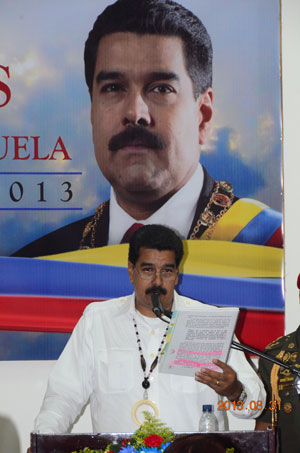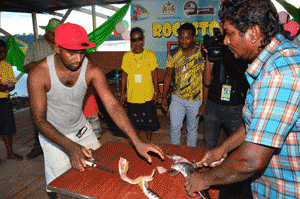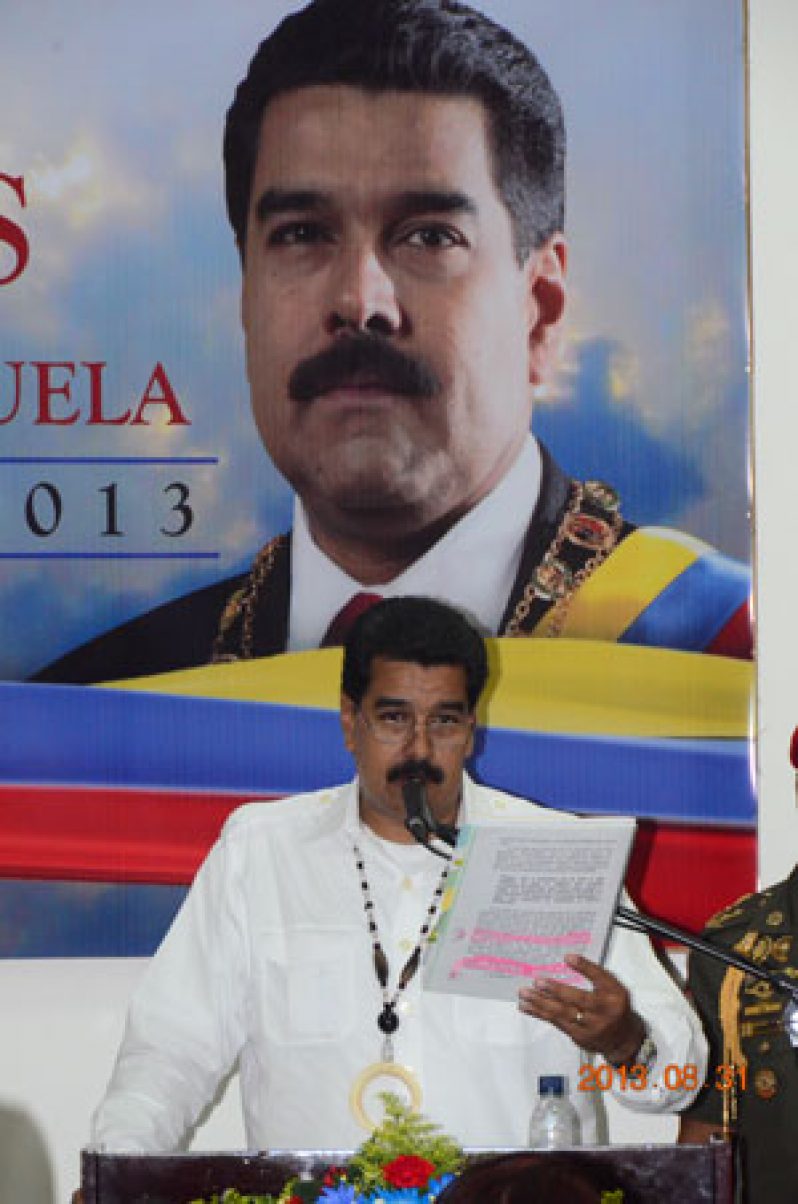THE Venezuelan Head of State, President Nicolas Maduro has reiterated his country’s commitment to the United Nations Secretary General’s Good Offices process in order to maintain dialogue between Venezuela and Guyana regarding the territorial integrity of the Essequibo region, which historically has been a bone of contention between the two South American neighbours.


 Noting that the Good Offices channel was adopted in 1983 after years of tension and even military skirmishes regarding Essequibo, he congratulated current UN Good Officer for Guyana and Venezuela Professor Norman Girvan and remarked that the Good Offices “were functioning very well.”
Noting that the Good Offices channel was adopted in 1983 after years of tension and even military skirmishes regarding Essequibo, he congratulated current UN Good Officer for Guyana and Venezuela Professor Norman Girvan and remarked that the Good Offices “were functioning very well.”
When quizzed by this publication as to what steps his administration might take to conclusively resolve the status of Essequibo, the largely forested and minerals-rich region which makes up nearly two thirds of Guyana, President Maduro dismissed any suggestion that a question mark remains on the area.
Speaking alongside Guyana’s President Donald Ramotar at a joint press conference during his State Visit yesterday, the Venezuelan President reminded the audience that the dispute was “a legacy of colonialism”. The territorial dispute over Essequibo dates back to a contest between Spanish and Dutch colonialists for territory. It later evolved into a clash between an independent Venezuela and the United Kingdom-governed British Guiana.
“It means that such a dispute is not the responsibility of the independent nations of today,” Maduro explained, saying that the issue is precisely “the wounds of old colonialisms” the Uruguayan author, Eduardo Galeano wrote of in his book, ‘The Open Veins of Latin America’.
The dispute between the United Kingdom and Venezuela had been settled under an arbitration process of 1899. However, the Venezuelan President asserted that the resuscitation of the Venezuelan claim to the Essequibo region in 1962 was planned to deliberately coincide with the impending onset of independence for British Guiana.
According to Maduro, there was a US-abetted campaign by the Venezuelan army via the Spanish-speaking country’s media “to create a psychological [by the Venezuelan people] position against [Guyana] expressed through hatred and racism in order to invade this country.” Referring to what he termed “declassified documents”, the Venezuelan President noted that the purpose of such a campaign “neutralise and undermine the independent forces of the Left in Guyana.” In the 1960s, the ascendancy of Marxist forces was deemed by the United States to be a threat, and that country repeatedly took covert and overt action against leftist elements globally.
Maduro urged the peoples of Guyana and Venezuela to remain cognisant of the West’s role in the dispute, declaring to loud applause: “We need to understand where we are standing and [then] no one [can] manipulate us and no can raise the flags of hatred and beat the drums of war. We need to be brothers and sisters [so] the media could not foster hatred between the nations. We have chosen the path of Chavez, to say the truth, to look for peace, to abide by international law.”
He pointed out that in 1966, however, an agreement between Venezuela and the UK, establishing a mechanism for discussion on how to establish the limits of the borders, was signed in Geneva. That treaty had set aside a period of four years until 1970 to settle the differences, Maduro said, noting: “However, those four years were not enough.”
And on June 18th, 1970 in Port of Spain, he went on to note, the Protocol of Port of Spain was signed between Rafael Caldera of Venezuela and Guyana’s Forbes Burnham.
There it was set forth to put a twelve year moratorium on the Venezuelan dispute, he recalled. As the Venezuelan President recounted the history of the dispute, he quipped to this reporter: “You are very young, you are less than thirty years old, we guess.”
Noting that border issues are usually “difficult topics, complex topics”, he emphasised that Venezuela has “decided that these difficult matters are going to be dealt with through peace and diplomacy.”
“Never again in the history of our countries [should they] allow themselves to be dragged into the path of hatred, of chauvinism, of racism or enable intrigue to harm the moral body of our two nations,” Maduro concluded.




.png)









